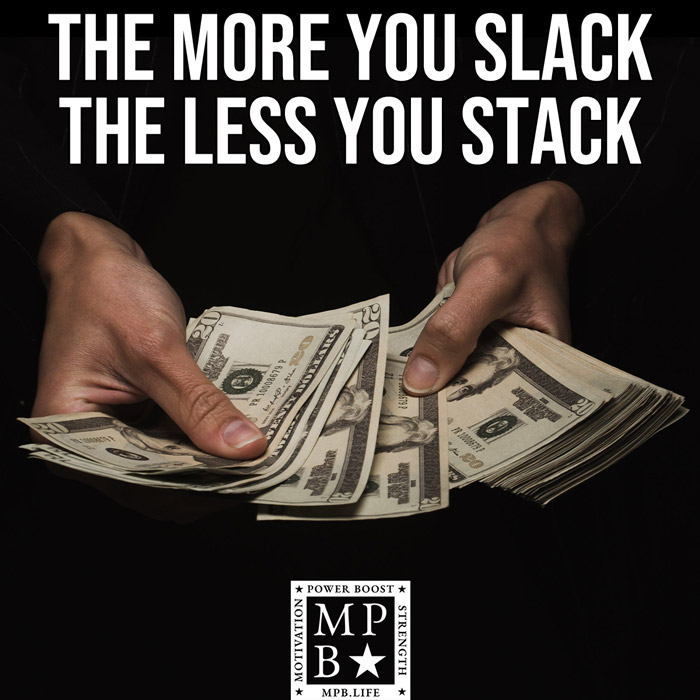
The More You Slack Graphic © motivationpowerboost.com
THE MORE YOU SLACK
THE LESS YOU STACK
Embracing the Paradox: How Slacking Can Hinder Your Success Stack
We live in a society that often glorifies the hustle culture, where burning the midnight oil and pushing oneself to the brink of exhaustion are seen as badges of honor. However, amidst this relentless pursuit of productivity, it’s crucial to recognize the hidden truth behind the seemingly clever quip, “The more you slack, the less you stack.” This phrase, while catchy, encapsulates a profound lesson about the delicate balance between rest and achievement.
At first glance, the idea of slacking might conjure up images of laziness and wasted potential. After all, we’ve been conditioned to believe that success is built upon a foundation of tireless effort and unwavering dedication. But what if we challenged this notion and explored the counterintuitive wisdom that lies beneath the surface?
The truth is, when we constantly push ourselves to the limit, neglecting the importance of rest and rejuvenation, we inadvertently sabotage our own progress. Just as a muscle requires periods of rest to grow stronger, our minds and bodies need moments of respite to function at their peak. By perpetually operating in a state of exhaustion, we diminish our creativity, problem-solving abilities, and overall effectiveness.
Slacking, in this context, doesn’t mean shirking responsibilities or abandoning our goals. Instead, it refers to the conscious choice to prioritize balance and self-care. It’s about recognizing that taking breaks, engaging in hobbies, and nurturing our relationships are not frivolous indulgences but essential components of a well-rounded and fulfilling life.
When we allow ourselves the space to recharge, we open the doors to greater inspiration, clarity, and resilience. We become better equipped to tackle challenges, make sound decisions, and bring our best selves to the table. Ironically, by embracing the art of intentional slacking, we create the foundation for a more robust and sustainable success stack.
However, it’s important to strike a delicate balance. Slacking should never become an excuse for complacency or a justification for mediocrity. The key lies in finding the sweet spot between focused effort and restorative downtime. It’s about strategically allocating our energy, knowing when to push hard and when to step back and recharge our batteries.
So, the next time you find yourself caught in the whirlwind of endless tasks and responsibilities, remember the wisdom hidden within the phrase, “The more you slack, the less you stack.” Embrace the power of intentional breaks, prioritize self-care, and trust that by doing so, you are laying the groundwork for a more resilient and fulfilling journey to success.
In the grand tapestry of life, it is the interplay of effort and rest, the yin and yang of productivity and rejuvenation, that ultimately leads to a well-rounded and purposeful existence. By challenging the conventional wisdom and embracing the paradox of slacking, we unlock the potential for a more balanced and authentic version of success – one that honors our humanity and celebrates the beauty of a life well-lived.
Finding the Right Rhythm: Mastering the Art of Productive Downtime
While the significance of taking breaks and engaging in restorative activities is undeniable, the true challenge lies in mastering the art of productive downtime. It’s a delicate balancing act, one that requires self-awareness, discipline, and a keen understanding of our individual needs and goals.
The first step in this journey is to identify our personal rhythms and patterns. Some individuals thrive on shorter, more frequent breaks, while others prefer longer periods of uninterrupted focus followed by more substantial downtime. Recognizing these preferences and tailoring our schedules accordingly can unlock a newfound sense of energy and productivity.
It’s also crucial to curate our downtime activities with intention. Mindless scrolling through social media or binge-watching countless hours of television may provide temporary respite, but they rarely leave us feeling truly rejuvenated. Instead, consider activities that nourish your mind, body, and soul – whether it’s reading a thought-provoking book, engaging in physical exercise, practicing a creative hobby, or spending quality time with loved ones.
Moreover, the power of productive downtime extends beyond individual well-being. In collaborative environments, fostering a culture that values and promotes restorative breaks can have a profound impact on team dynamics and overall organizational success. By encouraging open dialogues about work-life balance and providing resources for self-care, leaders can cultivate a workforce that is energized, engaged, and primed for peak performance.
It’s important to remember that the journey to mastering productive downtime is not a linear path. There will be moments of trial and error, times when we find ourselves overindulging or struggling to disconnect. Embracing this process with self-compassion and a growth mindset is crucial, as it allows us to continually refine and adapt our approach to suit our ever-evolving needs and circumstances.
Ultimately, the art of productive downtime is not about sacrificing ambition or settling for mediocrity; it’s about recognizing the inherent value in balance and self-care. By intentionally incorporating restorative practices into our lives, we unlock the potential to achieve sustainable success, creativity, and fulfillment – a harmonious symphony of effort and rejuvenation that resonates through every aspect of our personal and professional endeavors.
Related Inspirational Quotes
“The greatest wealth is to live content with little.” – Plato
“It is not the man who has too little, but the man who craves more, that is poor.” – Seneca
“An arrogant man flatters the rich, but only the poor are his true brothers.” – Kahlil Gibran
“Diligence is the mother of good fortune, and idleness, its opposite, never brought a man to the goal of any of his best wishes.” – Miguel de Cervantes
“Rest satisfied with doing well, and leave others to talk of you as they will.” – Pythagoras
